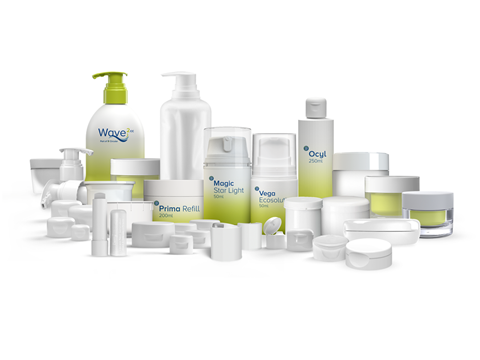
Berry has announced that many of the products manufactured with polypropylene (PP) in its B Circular range of beauty and personal care products are now available with its CleanStream recycled plastic packaging.
Berry’s CleanStream technology reportedly has the capacity to recycle nearly 40% of all polypropylene waste collected from domestic recycling bins in the United Kingdom (based on 2017 data from WRAP’s PlasticFlow 2025: Plastic Packaging Flow Data Report). It is said to offer the UK’s first domestically recovered, mechanically recycled, contact-sensitive, recycled plastic at scale.
According to an in-depth life-cycle analysis by Quantis - assuming 36kMT output at 1.96kg - packaging made with CleanStream recycled material from Berry’s Leamington Spa facility has around 35% lower CO2 emissions than virgin plastic, a reduction of about 36,000 tonnes of CO2 annually.
Apparently, CleanStream recycled plastic can be used in manufacturing a range of B Circular products including closures, atmospheric and airless dispensers, jars, and applicators. Berry states the material has been ‘extensively tested’ across a range of products and processes to ensure it satisfies the standards for contact-sensitive personal care and beauty applications.
As well as including CleanStream and other post-consumer recycled plastics in the packs, Berry says other initiatives to meet these objectives include developing reusable and refillable packs; packs designed to RecyClass and Association of Plastic Recyclers guidelines to improve recyclability; lightweighting of packs; and the use of renewable resources, such as forestry residue and used cooking oils, to replace fossil fuel feedstocks.
“Any recycled plastic for packs has to meet the highest levels of performance in terms of protecting and preserving the product and maintaining its quality and effectiveness,” said Elodie Roger, Berry Global CPI’s vice president of Sustainability. CleanStream recycled plastic meets these requirements and is already being used by several leading personal care brands who are incorporating up to 100% of the recycled plastic in their packaging,” Roger adds. She says the company is making the material available in its B Circular range in anticipation of the forthcoming Packaging and Packaging Waste Regulation.
Berry collaborated with French cosmetics company La Rosée last month to co-develop a refillable stick for its déodorant product, said to offer a weight reduction of 62% compared to a full stick. While initial production of the new stick was in virgin PP, Berry and La Rosée are working to switch the Exclusive Refill to include Berry’s proprietary CleanStream recycled PP for contact-sensitive applications.
A recent report by RaboResearch – Rabobank’s analysis and knowledge team – states that the demand for recycled polymers has grown in the US and UK markets and is expected to continue to rise in the coming years, primarily driven by state regulation and company pledges in the US and EU-level regulation. RaboResearch states that to meet the PPWR’s 2030 goals, Europe must triple its recycled plastic production from 2021 levels.
If you liked this story, you might also enjoy:
How are the top brands progressing on packaging sustainability?
Sustainable Innovation Report 2024: Current trends and future priorities
Reuse vs. single use – which is better for the environment?
The ultimate guide to global plastic sustainability regulation














No comments yet